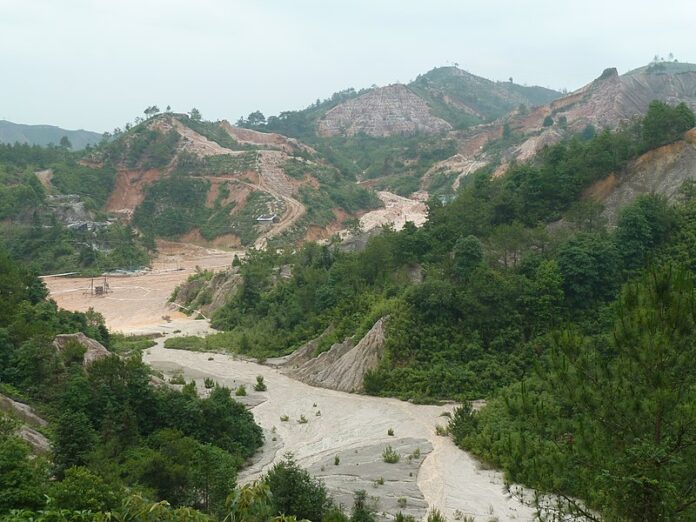World governments have repeatedly sworn to achieve net-zero, but additional critical mineral mines are needed to reach that goal.
By J. Peter Pham
The message from the World Economic Forum, convening in-person last week in its traditional January slot for the first time since the COVID pandemic, could not have been clearer. United States Special Presidential Envoy for Climate John Kerry declared that “time is running out” to tackle climate change and worried that it may be too late get to a low carbon economy in time to stave off the worst effects on the most vulnerable people. Not to be outdone, United Nations Secretary-General Antonio Guterrres was even more apocalyptic in his remarks: “We are flirting with climate disaster. Every week brings a new climate horror story…for many, this is a death sentence.”
But if the sense of urgency at the placid Alpine resort was heightened, less was said, alas, about what it would take to do something about it. The otherwise smooth slope to reducing greenhouse gas emissions and becoming carbon neutral runs smack into a rather nasty mogul lurking just below the powder of these green dreams: an adequate supply of the critical minerals and other materials essential for the transition to clean energy systems.
Often overlooked in conversation about climate adaption is that the material requirements for energy systems powered by clean technologies differs profoundly from older systems: solar plants, wind farms, and electric vehicles (EV) all require more minerals than fossil fuel-based alternatives. A typical EV needs six times the minerals of a conventional automobile and building an onshore wind plant requires nine times the minerals that would go into a gas-powered installation. According to the International Energy Agency, to achieve the ambitions inscribed in European Union (EU) Climate Law to achieve net-zero by mid-century – a goal echoed in President Joseph Biden’s December 2021 executive order – cumulative demand for minerals for use in EVs and battery storage will grow thirty times by 2040, with lithium leading the way with demand growing 40 times, followed by graphite, cobalt, and nickel (20-25 times). Copper, especially for the electrical grid, appears to be a relative laggard with demand simply doubling in that time, until one considers that then total current global production capacity for copper is about 20 million tons per year and, even the most optimistic scenario, leaves annual supply gap of about nearly 10 million tons by 2035.
Compounding the challenge is the relative concentration of sourcing and processing of these critical minerals. The Democratic Republic of the Congo (DRC), China, and Indonesia account for about 70 percent, 60 percent, and 30 percent of the world’s production of cobalt, rare earth elements (REEs), and nickel, respectively. When it comes to processing, China dominates supply chains across the board, refining about 90 percent of the global supply of REEs, two-thirds of the lithium and cobalt, and almost 40 percent of the nickel – and this is before one factors in investments that Chinese companies have made in Australia, Latin America, and Africa. As the IEA put it diplomatically, “High levels of concentration, compounded by complex supply chains, increase the risks that could arise from physical disruption, trade restrictions or other developments in major producing countries.”
While boosting domestic production is a politically popular response – witness the incentives in Biden’s Inflation Reduction Act last year as well as in the package unveiled at Davos by EU Commission President Ursula von der Leyen – and should be pursued where practical, geology means that a sufficient domestic supply chain will not always be possible. Moreover, even where resources are available, the long development times can be daunting: IEA calculates that it takes an average of 16 years to move a mining project from discovery to first production.
Consequently, finding and securing sufficient supply chains for the critical minerals and other strategic materials indispensable for the clean energy transition in the time necessary will require an “all-of-the-above” approach that prioritizes existing resources and focuses on lowering the risk of bottlenecks and other disruptions. The memorandum of understanding signed between the United States, the DRC, and Zambia during last month’s U.S.-Africa Leaders Summit to strengthen the EV value chain is one example of step in the right direction as is the Mineral Security Partnership, the new pact to bolster critical mineral supply chains and including Australia, Canada, Finland, France, Germany, Japan, South Korea, Sweden, the United Kingdom, the United States, and the European Commission. And, as I argued last year in a Krach Institute for Tech Diplomacy study, in building resilient supply chains, America and Europe will need to look beyond the circle of their closest allies, not only to other countries such as Treasury Secretary Janet Yellen did when she touted “friendshoring” in South Africa recently, but also to publicly traded multinationals, even those whose owners may not necessarily be “clubbable”—what ultimately matters is whether they can help diversify and, thus, derisk access to strategic material.
A carbon neutral future is today a shared dream, but the path to its realization will require more sustained focus on obtaining sufficient quantities of the minerals needed for clean energy systems. Without the mines – and secure access to their output – the dream will may well turn into the very nightmare that vexed so many voices at Davos.
Originally published by RealClearEnergy. Republished with permission.
Ambassador J. Peter Pham is an Atlantic Council Distinguished Fellow and a Senior Advisor at the Krach Institute for Tech Diplomacy. He previously served as U.S. Special Envoy for the Sahel and the Great Lakes Regions of Africa.
To read more about rare and critical mineral mining, click here, here, and here.


























